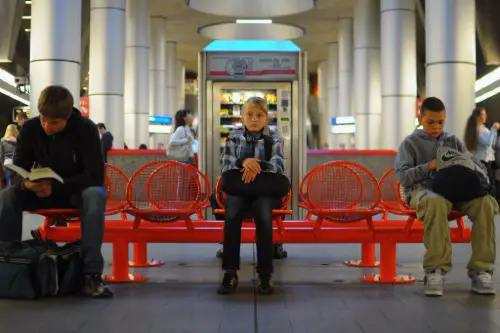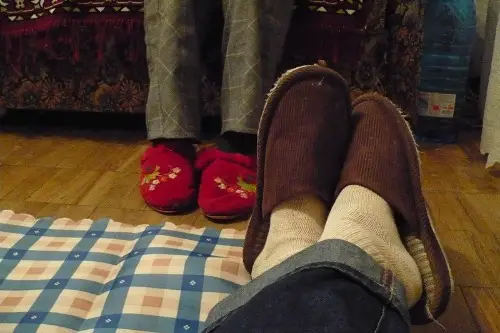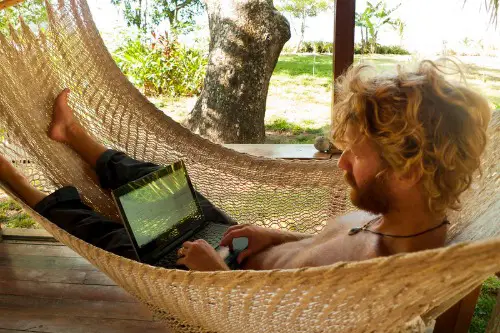1. Personal Space: The Invisible Bubble

Americans tend to keep a pretty large personal space bubble — about 18 inches to 2 feet during casual interactions. Stand too close, and people get uncomfortable fast, according to Frank Bures of Rotary International. In contrast, in countries like Brazil or Saudi Arabia, people naturally stand much closer when talking, even with strangers. Backing away might even seem rude.
The American emphasis on personal space stems partly from the value placed on individualism. It’s also influenced by car culture and suburban living, where space is the norm. So when we visit other places, we often feel like people are “up in our space,” even though they’re just being social. But in the U.S., keeping that bubble intact is a sign of respect.
2. Wearing Shoes Indoors

Many Americans wear shoes inside their homes without a second thought, Aaron Ant of BuzzFeed explains. It’s considered normal in many parts of the country, though some regions or households do ask guests to remove them. In countries like Japan, South Korea, and much of Scandinavia, wearing shoes indoors is a big no-no. It’s viewed as disrespectful and unhygienic.
The practice stems from practical and cultural roots — removing shoes helps keep the house clean and is part of ritual cleanliness. In contrast, the American tendency comes from a less formal approach to indoor/outdoor boundaries. Even when traveling, some Americans forget to check this norm, unintentionally offending hosts. But at home, it still feels completely acceptable.
3. Constant Refills — for Free

In most American restaurants, your drink glass will magically refill without you even asking — and you won’t be charged extra, Sayed Kashua of The New Yorker explains. Free refills are so common that we barely notice them. But in most parts of Europe, refills cost extra, and asking for one can lead to confusion. It’s especially surprising with soda or coffee, which are typically served in smaller portions.
The American model is based on volume and customer satisfaction — bottomless coffee at a diner is practically a cultural institution. Abroad, where beverage portions are more conservative and service isn’t tied to tips, refills are rare. So this is one of those quirks that feels generous at home but excessive elsewhere. Still, to us, it’s just good service.
4. Smiling at Strangers

In America, flashing a smile at someone you pass on the street is often just a friendly acknowledgment, Olga Khazan of The Atlantic explains. It doesn’t mean you want to chat or that you know them — it’s just polite. But in many other countries, like Russia or Germany, smiling at strangers can come across as odd or even insincere. People may assume you’re overly familiar or hiding something.
Americans see smiling as a sign of warmth and openness, but in places where emotional expression is more restrained, it’s viewed with suspicion. Some cultures interpret constant smiling as a lack of seriousness or depth. This cultural mismatch can lead to awkward first impressions abroad. Still, we keep doing it — because to us, it’s just being nice.
5. Asking “What Do You Do?” Right Away

In the U.S., one of the first things you ask someone you meet is, “What do you do?” It’s a go-to icebreaker and a way to understand someone’s lifestyle or interests. But in many cultures — like the Netherlands or France — asking about someone’s job too soon can feel intrusive. It implies you’re sizing them up by their status or income.
Americans often equate work with identity, so the question feels natural. But elsewhere, personal identity isn’t so tightly bound to career. Starting with that question may seem impolite or too forward, especially in more privacy-conscious cultures. Still, back home, it’s just small talk.
6. Talking to Total Strangers

If you’re standing in a long line in the U.S., someone might strike up a chat about the weather, sports, or even your shoes. It’s part of a social norm that casual conversation is polite and often expected. In countries like Sweden or Japan, that kind of approach can feel invasive or inappropriate. Silence in public spaces is more valued there.
Americans are taught to be friendly and open, and making small talk is part of that. It’s how we build rapport and avoid awkwardness. But not every culture sees silence as uncomfortable. Even so, we keep chatting — sometimes to fill the space, sometimes just because we’re bored.
7. Asking “How Are You?” — and Not Really Meaning It

“Hey, how are you?” is the default American greeting, but it’s not actually a request for a detailed answer. Most of the time, people expect a quick “Good, how are you?” and move on. This can be baffling to people from countries where that question implies genuine concern and invites a real conversation. In Germany, for example, asking how someone is doing implies you really want to know.
To Americans, it’s more of a polite verbal handshake — part of a smooth social script. We don’t mean to be insincere; we’re just trying to be friendly. But if you answer with your life story, it may throw someone off. Still, we stick to this rhythm — it just feels right.
8. Giving a Thumbs-Up

In the U.S., a thumbs-up is the universal sign for “Good job!” or “All good!” It’s so ingrained that we use it in real life and online without thinking. But in countries like Iran or parts of West Africa, the gesture can be vulgar or offensive — akin to giving someone the middle finger. The meaning of hand gestures varies widely across cultures.
Americans often assume certain signs are universal, but nonverbal communication can be a cultural minefield. The thumbs-up just feels positive to us, but it’s a reminder that body language isn’t always global. It’s a little thing, but it can lead to big misunderstandings abroad. Yet at home, it’s just a go-to way of showing approval.
9. Bringing Up Work on Vacation

Americans often talk about work even while they’re supposed to be relaxing. It’s not unusual to check emails on the beach or take calls during a family trip. In many other countries, like France or Italy, vacation is sacred — and discussing work during leisure time is seen as disruptive or obsessive. Taking a real break is a protected right, and people fiercely defend their time off.
The American tendency reflects a culture that prizes productivity and sees downtime as a luxury, not a right. We’re also more likely to have fewer vacation days, so the boundary between work and play blurs. This mindset surprises many foreigners, especially those with stronger labor protections. But in the U.S., the hustle never quite turns off.
10. Apologizing When It’s Not Your Fault

Americans say “sorry” a lot — not always out of guilt, but often just to smooth things over. Whether someone bumps into us or we accidentally interrupt, “sorry” rolls out instinctively. In countries like France or Israel, over-apologizing can be seen as a lack of confidence or unnecessary. People may find it odd to apologize for things you didn’t do.
The American use of “sorry” is more about politeness and keeping interactions low-conflict. But in other places, it’s expected that you only say it when you mean it. Overusing the word may come off as inauthentic or even annoying. Still, for Americans, it’s a catch-all softener we don’t think twice about.
11. Tipping for Nearly Everything

In the U.S., tipping isn’t just for restaurants — we tip hairdressers, Uber drivers, hotel housekeeping, baristas, and even furniture movers. The social expectation to tip has expanded to nearly every service interaction. But in many countries, tipping is either built into wages or limited to exceptional service. In places like Australia or Denmark, service staff earn a living wage and tipping is minimal or nonexistent.
The American tipping culture developed because service wages have long been kept low, particularly for servers who rely heavily on tips to earn above minimum wage. This has led to a confusing patchwork of expectations and percentages, especially for travelers. Abroad, Americans often over-tip, thinking they’re being generous when it’s not necessary. Still, back home, skipping a tip can feel almost scandalous.
12. Saying “Excuse Me” for Everything

In the U.S., we say “excuse me” constantly — when we sneeze, walk past someone, or even want to join a conversation. It’s part of our way of signaling politeness and respect for personal space. But in other cultures, especially where social boundaries are different, it’s used far less often. In countries like China or Russia, people may move past you silently without any such acknowledgment.
Americans are trained early to be hyper-aware of how their actions affect others in shared spaces. So “excuse me” becomes a reflex, not necessarily a sign of guilt. It’s polite in our context, but can feel excessive elsewhere. Still, it’s a habit that feels courteous and considerate to us.
13. Being Enthusiastically Positive

Americans often speak in enthusiastic, upbeat tones — saying things are “awesome,” “amazing,” or “literally the best ever.” Even when things are just okay, we tend to hype them up. In more understated cultures, like the UK or Finland, this level of exuberance can feel fake or exaggerated. People may not take you seriously if everything you say sounds like a commercial.
This positivity is tied to American optimism and the cultural emphasis on confidence and self-promotion. We value encouragement and motivation, often through expressive language. But that same energy can come across as over-the-top or insincere in more reserved societies. At home, though, it’s just how we show excitement.
14. Saying “Bless You” After a Sneeze

In the U.S., it’s second nature to say “Bless you” or “Gesundheit” when someone sneezes. Most people don’t think about why — it’s just a reflexive act of politeness. But in some countries, like Japan or China, people usually ignore a sneeze entirely. There’s no cultural expectation to respond unless you’re close friends or family.
The American version likely has religious roots — a blessing to protect from illness or misfortune. Over time, it evolved into a standard social nicety, even among strangers. Abroad, though, this can lead to puzzled reactions or even embarrassment. Still, we do it without thinking — it’s part of our sneeze etiquette.
15. Over-Explaining Everything

Americans often explain their decisions or actions in detail, even when it’s not required. Whether we’re turning down an invite or returning something to a store, we tend to give a reason. In some countries, like France or the UK, this can seem excessive — people often state their case briefly and move on. Too much explanation can feel defensive or even suspicious.
This habit likely stems from a cultural emphasis on transparency and not wanting to seem rude or abrupt. We worry that saying “no” without a reason might offend, so we cushion it. But outside the U.S., it’s common to be more direct without seeming impolite. Still, we keep justifying — because it feels like the polite thing to do.


